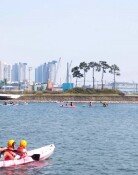Are Samsung-Hanwha mega big deals a sign of industrial restructuring
Are Samsung-Hanwha mega big deals a sign of industrial restructuring
Posted November. 27, 2014 08:06,
Samsung Group sold four subsidiaries in the defense and petrochemical industries, including Samsung Techwin, Samsung Thales, Samsung General Chemicals and Samsung Total, to Hanwha Group for combined 1.9 trillion won (1.715 billion U.S. dollars). The mergers and acquisitions between the two business groups are the largest in scale since the Asian financial crisis in 1997, and are drawing keen attention because the deals were forged without the governments intervention. Through the M&As, Hanwha can boost its business through the economy of scale that will elevate its defense and petrochemical businesses to No. 1 in sales, while Samsung is embracing a great opportunity for restructuring to focus on its flagship businesses including electronics, financial service, and construction.
It is meaningful that Hanwha, which underwent a managerial crisis due to the arrest of its owner, Chairman Kim Seung-yeon, has formed a revamped business portfolio focusing on petrochemical and defense businesses as a result of Kims bold decision. Samsung decided to sell non-flagship businesses at a time when the electronics business is struggling due to deteriorating profitability amid Chairman Lee Kun-hees managerial absence. The fact Vice Chairman Lee Jae-yong of Samsung Electronics displayed commitment to focus on its core competence through selection deserves positive assessment.
Under the oversight of the International Monetary Fund soon after the Asian financial crisis, conglomerates were forced by the government to forge big deals against their will. Chairman Koo Bon-moo of LG Group, who had to hand over LG Semiconductors to Hyundai Electronics at the pretext of a big deal in semiconductors at the time, has suffered severe aftereffect so serious that he is still not attending chairmen meetings at the Federation of Korean Industries. Considering that POSCO and KT, which aggressively expanded their business portfolios during the Lee Myung-bak administration, are paying the hefty price of falling profitability right now, one can realize how ruthless market judgment can be over erroneous managerial decisions.
It is premature to calculate financial gains and losses stemming from the latest M&A deals. Whether Hanwhas decision to focus on petrochemical and defense businesses even by shouldering the financial burden of 2 trillion-won (1.8 billion dollars) investment will prove to be a success or not will depend on how significant synergistic effect its top managers will generate following the mergers. Samsung felt sense of crisis that it would not remain the world best company in electronics unless it splits off non-flagship businesses, and hence opted for a strategy to reduce its size.
In the globalized economy, companies could have difficulties even surviving unless they remain No. 1 in their sectors. Self-arranged mergers and acquisitions between the two conglomerates, Samsung and Hanwha, send an important message on growth strategy to other Korean conglomerates. Samsung Electronics Vice Chairman Lee is being tested for his managerial capacity. Hanwha has the bitter memory of giving up a deal to take over Daewoo Shipbuilding & Marine Engineering, even after announcing its bid and paying 315 billion won (284 million dollars) in down payment, for failing to make second payment in 2008. The two conglomerates have illustrated this time that even chaebol companies are no exceptions to restructuring if they are to survive the jungle where the survival of the fittest prevails.







